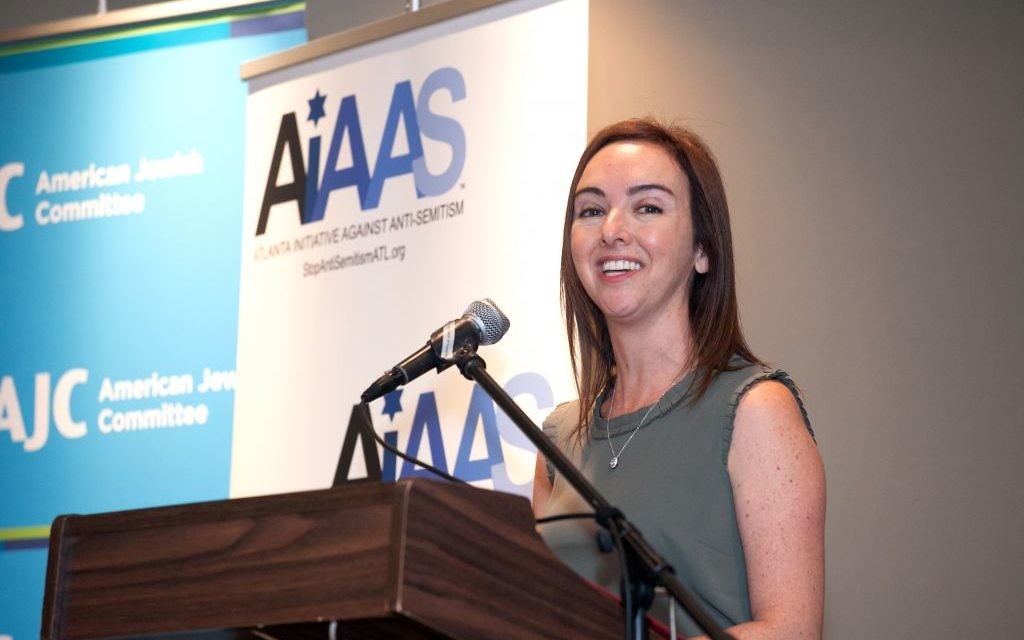Anti-Semitism as a Teachable Moment
AIAAS organizes a meeting to counter hate and share best practices for Atlanta-area schools.

Parents and educators look for “teachable moments,” when circumstances present an opportunity to impart wisdom or suggest a better course of action.
These moments often are the result of actions that are regrettable, misguided or sometimes just plain stupefying.
In recent months, local examples have included:
Get The AJT Newsletter by email and never miss our top stories Free Sign Up
- Teenagers from a private school playing a version of beer pong called Jews vs. Nazis, with cups arranged as a star of David and a swastika. This became known when the organizer posted a photo online. (Yes, beer pong is a thing. Readers unfamiliar with this game can look it up online.)
- Another private school put Adolf Hitler’s “Mein Kampf” (“My Struggle” in German) on a summer reading list. It was done with the best of intentions, to help young people learn how groups such as the Nazis come to power.
- A public middle school teacher asked students to create a mascot — give it a name and provide a “colorful illustration” — for the Nazi Party. This was not part of the recommended Holocaust curriculum.
- At a public high school, mock valentines with anti-Semitic slogans were distributed online.
Though the first impulse often is to punish (and sometimes punishment is meted out; the beer pong game resulted in five suspensions and one expulsion), these occasions also offer the chance to educate and to mentor.
This is where the Atlanta Initiative Against Anti-Semitism has found its teachable moment.
When last heard from, AIAAS (a mouthful of an acronym) was an upstart, a dozen day school moms and a small army of volunteers who, from scratch, organized a meeting in March at which some 225 people discussed anti-Semitism in Atlanta.
AIAAS is back, planning a Nov. 8, invitation-only meeting, once again hosted by Temple Emanu-El, to focus on a priority expressed by participants in that first session: anti-Semitism and hate activity in schools. The meeting has its own acronym: TASK (Tackling Anti-Semitism for Our Kids).
“We don’t want to get out the pitchforks. We want to increase dialogue about it,” said Lauren Menis, who credits her fellow AIAAS co-founders, Danielle Cohen and Lisa Freedman, for their detail-oriented approach to planning.
There is something ironic about a meeting on anti-Semitism in schools being planned by parents whose children attend Jewish day schools, where such incidents are, well, unlikely.
The Anti-Defamation League reports that anti-Semitism is increasing in the nation’s schools.
Reporting by the Jewish newspaper in the Bay Area of California makes clear the scope of the problem beyond Atlanta.
“I worry about the impact of anti-Semitic language and conduct on non-Jewish students who know very little about Jews and Judaism, and may not even know a Jewish person. I worry that years of hearing degrading language and stereotypes about Jews will infect them with bias,” an educational consultant wrote in a Boston Globe op-ed.
AIAAS has invited administrators and staff from public school districts — Atlanta Public Schools, DeKalb County, Fulton County, Gwinnett County, along with the Decatur and Marietta districts — as well as private schools, Jewish congregations, Jewish and non-Jewish advocacy organizations, and other groups that combat various forms of hate.
A resource fair afterward will make available to educators materials from about a dozen organizations on best practices for teaching about the Holocaust, combating anti-Semitism, and instilling tolerance and compassion in children.
The meeting will be closed to the news media, an accommodation to speakers (not being publicly identified in advance) who are not seeking wider attention.
“We have gotten so many confidential emails from parents or posts on our Facebook page about incidents that have happened at schools. And they don’t know what to do,” Menis said, adding that some parents don’t go public “because it sets their kids up to be victims even more.”
In some instances, parents have moved their children to other schools, Menis said.
You rarely know when a teachable moment will happen, but give AIAAS a gold star for preparation.




comments